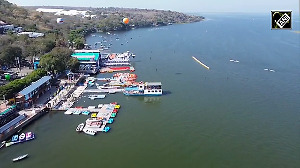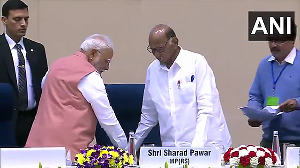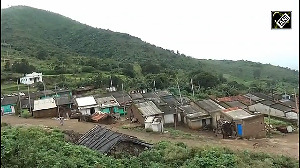'The jungles of Doda covers about 250 km.'
'Sleeper cells are providing active help to the terrorists.'
'The terrain and situation is such that it is not possible to keep track of every inch.'

"It will be a man-to-man search of terrorists in the jungles," says retired Major Sammar Pall Singh Toor, who has conducted counter-terror operations in Jammu and Kashmir.
Major Toor, a third generation officer of the armed forces, has participated in daring missions along with special forces units that neutralised terrorists in J&K. Post retirement, he is part of the Zulu Defence System, a drone and tactical air defence start-up.
Security forces have intensified search operations in heavily forested areas after a surge in terror activity in the Jammu region.
This month 11 soldiers have lost their lives in encounters with terrorists in the area. Since October 2021, nearly 50 security personnel have been killed in the Jammu area which had been peaceful for over a decade.
According to the home ministry 28 terrorists have been eliminated in J&K in recent days.
In an interview to Rediff.com's Archana Masih, Major Toor talks about the challenges posed by the tough terrain in hunting down terrorists, and how Pakistan backed terror operatives have changed their strategy.

As an army man who has been part of anti-terror ops in J&K, what do you think of the modus operandi of the terror groups active in the Jammu region?
These shell/shadow groups are sub parts of Jaish-e-Mohammed and Hizbul Mujahideen.
They are operating under a different name because Jaish and Hizb are designated global terrorists and feature in the financial black list.
Terror groups have started targeting small groups of military movements on isolated highways -- one gypsy with one truck or 2-3 trucks with a small armoured vehicle.
It is not possible to use armoured vehicles to carry luggage or equipment so normal trucks are used for that sort of movement.
Secondly, previously, terror groups used to attack in one group. Now one team is deployed at the curve where vehicles slow down to turn in hilly areas and the second team is positioned to provide cover.
They operate in groups of 4 to 6 terrorists who have adopted the hit and run strategy. They hit, run and hide in the dense forest.
There are many caves in the Doda forest region -- 300 or so.

How difficult is it to conduct search operations in the jungles?
It will be a man-to-man search of terrorists in the jungles. It is estimated that about 50 terrorists are operating and hiding in the jungles of Doda which covers about 250 km where cordon-search-destroy ops will gather momentum.
Underground support by sleeper cells is providing active help to terrorists. They also have local support.
The intelligence network has to be more effective, but at times the terrain and situation is such that it is not possible to keep track of every inch.
The terrorists are fidayeen, their motive is to come into Indian territory, challenge our sovereignty and die.
They want to inculcate maximum attrition on our forces, infrastructure and employ military strategy in a psychological way where the focus shifts from Kashmir to Jammu so that troops are moved [from Kashmir or Ladakh to Jammu] -- which the Indian Army will never do.
What kind of communication systems do these terrorists use? Why is it difficult to track them?
They have Chinese satellite phones with end to end encryption which cannot be tracked while being used.
Security agencies are working on how to counter the satellite communication system that terrorists are using with their handlers in Pakistan. Huawei is one of the main providers of satellite technology. It is a cause of major concern.

How does infiltration occur? How do these terrorists enter Indian territory?
Prior to 2018, the terrorists had a modus operandi of entering India via Sambha. They used to pose as porters and labourers to meet their point of contact in the vegetable market in Sambha.
Their underground workers or handlers used to hire them as labourers and then transported them through trucks to Doda, Srinagar and other places.
Earlier, the J&K police used to stop and check the back of the trucks, but after Operation Jhajjar Kotli in 2018, the police started conducting thorough checks which made terrorist mobilisation negligible, but it is not possible to stop it completely.
[Jhajjar Kotli was an intense anti-terror operation where Indian security forces tracked and eliminated terrorists. Major Toor was part of this operation.]
After these attacks, there will be more checks and balances, and technical upgrades, but at the end of the day security forces have to meet them face to face in the jungle and destroy them.
Getting someone alive will be a bonus.
How do these terrorists survive? How do they have so much ammunition?
They have limited ammunition, but they have plenty of dry fruits, chocolates, pain relief drugs and anesthesia injections. They inject local anesthesia whenever they are hit so that they can carry on longer in an encounter with Indian security forces.
They consume pain relieving and adrenalin pumping drugs during and before an encounter. When the Indian Army carries out sanitisation and clearance after the completion of anti-terror operation, it recovers food items, batteries, iridium phones.
This time the media has reported that they have recovered M4 and M16 guns.
Pakistan is notoriously famous for its weapons industry in Peshawar -- they can make a handmade replica of any weapon which will be in perfect firing condition and durable.
The Pakistan army has lost ground against Imran Khan. A majority of the Pakistani public is against the establishment and therefore, the Pakistan army is trying to create an aura of being valued by upping the momentum of attacks in J&K.
Pakistan's bluff should be called out and cognisance must be taken on the international stage.

What are difficulties of the terrain/forest which poses a challenge to our troops during combing/search operations against terrorists?
The terrain has a large nallah or flat riverbed and dense forests cover the entire axis from Rajouri, Poonch, Sundarbani and Akhnoor. The thick vegetation makes helicopter search redundant.
Drones can only be effective at night due to thermal imaging; at daytime drones are ineffective due to the thick vegetation.
Terrorism was completely wiped out from Batote towards Doda, Bhaderwah, Bhalra [Jammu region]. Bhaderwah is famous for its rajma and is a tourist destination.
This area was peaceful for the last 10 odd years, but terrorists have started sporadic attacks in this area.
Eleven soldiers have been killed in encounters with terrorists in July and there have been 6-7 terror attacks in the Jammu area since January. Why has there been a surge of terror activity in this region?
There are several reasons for this:
Due to the extreme weather, the passes opened 15, 20 days earlier than usual.
Some troops were moved to Eastern Ladakh after the Galwan clash in 2020. This resulted in some thinning down of deployment in the Jammu region. Some troops were pulled out of the Jammu region for the Amarnath Yatra and deployed on the Sonmarg and Gulmarg axis.
Thirdly, Pakistan wants to disrupt the proposed assembly election in J&K. A video was released where the commanders of Hizbul Mujahideen and Jaish-e-Mohammed have said that the attacks are to disturb the forthcoming elections.

How can the Jammu area be reinforced?
There are many infantry units in peace stations across the country. There are reserve battalions from where troops can be deployed, but that is up to the generals on how they will accommodate manpower paucity.
I am sure it has already been put into place.
What according to you are the measures to prevent such terror attacks and save the lives of security personnel/civilians?
Observation and surveillance is most important. There should be more check points and combing of areas before a convoy passes.
Terrorists have adopted a change of strategy by conducting smaller, sporadic, attacks to create terror.
Road opening parties have to be more active. Now with additional forces and infantry units being pumped into the Jammu region things will be better.
Feature Presentation: Ashish Narsale/Rediff.com











 © 2025
© 2025